Last night Markus gave a presentation in the unscientific lecture series for the students. The presentation was based on some of the recent research on the effects on boredom and how it could be managed in a temporary organisation – such as a mountaineering expedition.
Some TripleED socializing
 Honestly, there’s time for work and there is time for play. Tonight it was the latter. Parts of the group were enjoying some food together, life as an academic, methods and why we fo what we do. In addition of life in general and bag pipe manufacturing.
Honestly, there’s time for work and there is time for play. Tonight it was the latter. Parts of the group were enjoying some food together, life as an academic, methods and why we fo what we do. In addition of life in general and bag pipe manufacturing.
Oscar, Cecilia (and in part) Markus at the kickoff of their sub-project of the S&S arena
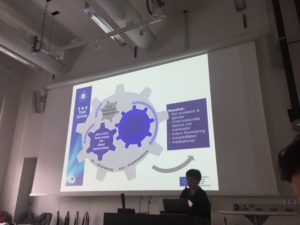 Together with Cecilia Hammar Wijkmark (MSB), Oscar and Markus was at the kickoff of the larger S&S test arena where they have a sub-project focused on developing operational command scenarios for the blue light services. It was a couple of interesting days with approximately 40 participants from academia, business and public organisations.
Together with Cecilia Hammar Wijkmark (MSB), Oscar and Markus was at the kickoff of the larger S&S test arena where they have a sub-project focused on developing operational command scenarios for the blue light services. It was a couple of interesting days with approximately 40 participants from academia, business and public organisations.
The photo describes the general idea behind the project.
Markus to co-convene track on extreme context and/or unconventional contexts; Opportunities and challenges for business studies
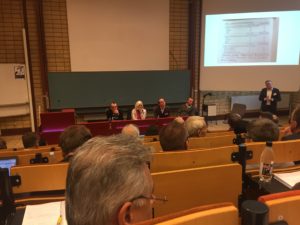 Together with professor Malin Tillmar (Linköping university) and Johanna Rein (Uppsala University) Markus co-convened a track at FEKIS (the Swedish association for business studies researchers) that focused on among other things extreme contexts. Opportunities such as frame breaking, increased access, juxtaposition and tweaking of existing theories were discussed. Challenges such as the ethics of becoming immersed in other, what could be, criminal activities (e.g. Sudhir Venkatesh – Gangleader for a day (great book!), language, cultural and social norms were also discussed. The picture is from the debate on business studies and ethics.
Together with professor Malin Tillmar (Linköping university) and Johanna Rein (Uppsala University) Markus co-convened a track at FEKIS (the Swedish association for business studies researchers) that focused on among other things extreme contexts. Opportunities such as frame breaking, increased access, juxtaposition and tweaking of existing theories were discussed. Challenges such as the ethics of becoming immersed in other, what could be, criminal activities (e.g. Sudhir Venkatesh – Gangleader for a day (great book!), language, cultural and social norms were also discussed. The picture is from the debate on business studies and ethics.
Markus to give presentation on “on Boredom in which parties are held on Mount Everest, and amusement is the key to survival”
 Markus has been invited to give a presentation at a university-wide student presentation initiative on the topic of “on Boredom – in which parties are held on Mount Everest, and amusement is the key to survival”. The presentation will be based on studies on Everest from 2013 and 2016. The full presentation schedule is available here
Markus has been invited to give a presentation at a university-wide student presentation initiative on the topic of “on Boredom – in which parties are held on Mount Everest, and amusement is the key to survival”. The presentation will be based on studies on Everest from 2013 and 2016. The full presentation schedule is available here
Katharina Dittrich on the The Ecology of Routines: How Interconnected Routines Circulate Quality
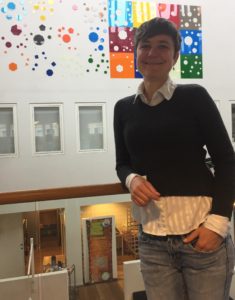 The other day we had the pleasure of listening to a very interesting seminar with Dr. Katharina Dittrich from University of Zürich. Katharina presented a paper on the ecology of routines – or how routines fits together and influences each other as they are performed. This is a very hot and important topic and it will be very interesting to follow Katharina´s and others work on it!!
The other day we had the pleasure of listening to a very interesting seminar with Dr. Katharina Dittrich from University of Zürich. Katharina presented a paper on the ecology of routines – or how routines fits together and influences each other as they are performed. This is a very hot and important topic and it will be very interesting to follow Katharina´s and others work on it!!
Katharina spent two days in Umeå interacting with the team and offering valuable insights on the work on organizational routines and practice theory.
Linda inducted in the Canadian Royal Academy of Social Sciences
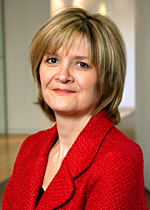 The other week Professor Linda Rouleau was inducted a fellow of the Canadian Academy of Social Sciences. Getting inducted in the Canadian Academy of Social Sciences is a great honor given to a few. Approximately 2000 scholars is elected by their peers to the academy, that was established in 1883 and whose primary objective is to promote learning and research in the arts, the humanities and the natural and social sciences.
The other week Professor Linda Rouleau was inducted a fellow of the Canadian Academy of Social Sciences. Getting inducted in the Canadian Academy of Social Sciences is a great honor given to a few. Approximately 2000 scholars is elected by their peers to the academy, that was established in 1883 and whose primary objective is to promote learning and research in the arts, the humanities and the natural and social sciences.
Congratulations Linda!!!
Text below from HEC Montreal´s website
*********
Full Professor Linda Rouleau (Management) has been inducted into the Academy of Social Sciences, Francophone Division, of the Royal Society of Canada. This announcement brings to 16 the number of HEC Montréal professors in this select group of over 2,000 distinguished Canadian scholars, artists and scientists, elected by their peers.
Professor Rouleau holds a PhD from HEC Montréal and Master’s and Bachelor’s degrees in Sociology from Université Laval. She has been with the School since 1998. Her fields of interest include middle managers, sensemaking in organizations and social and organizational practices in strategic and extreme settings.
A guest professor at the UMEÅ School of Business and Economics in Sweden, and co-Director of the Strategy as Practice Study Group (GéPS), she received the Pierre Laurin Award (Research) from HEC Montréal in 2011. Professor Rouleau has played an active part in developing and popularizing the concept of strategy as practice. For example, she co-directed the Cambridge Handbook of Strategy as Practice, the reference in this research field. She has also published articles in leading academic management journals
Robert passes milestone in academic career – presenting at his first conference
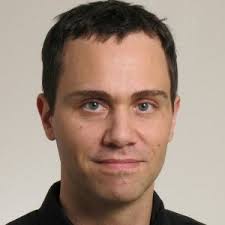 The other day Robert Kihlberg passed a milestone in his academic career when he presented our paper on the police reform. According to the audience the paper and presentation was well-received. Congratulations Robert, well done!!!
The other day Robert Kihlberg passed a milestone in his academic career when he presented our paper on the police reform. According to the audience the paper and presentation was well-received. Congratulations Robert, well done!!!
The reference for the paper is:
Kihlberg, R., Rantatalo, O., Lindberg, O., & Hällgren, M. ”Giving sense to reform: The workings of power in the change of the Swedish police”. 6:e Nordiska polisforsknings- konferensen. Oslo, Norway.
Markus at HEC Montreal for two weeks
 Markus have the pleasure of spending two weeks at HEC Montreal. Together with Linda Rouleau and Mark De Rond they are pushing a paper on Extreme contexts and its contribution to organization and management theory. Great advances are done and the work is as fun as ever. Other activities that are pursued is joint grant applications and various research related activities.
Markus have the pleasure of spending two weeks at HEC Montreal. Together with Linda Rouleau and Mark De Rond they are pushing a paper on Extreme contexts and its contribution to organization and management theory. Great advances are done and the work is as fun as ever. Other activities that are pursued is joint grant applications and various research related activities.
Consider submitting to EGOS sub-theme 53 “Resilient Organizing: Managing in Extreme Contexts and Situations of Crisis”
 At the upcoming EGOS conference in Copenhagen sub-theme 53 deals with the management and organizing of extreme contexts and crisis situations and is open to a diversity of theoretical approaches. The sub-theme is convened by Professor Daniel Geiger (Hamburg Universität), Professor Samer faraj (McGill University), Markus Hällgren (Umeå university) and we are looking forward to receiving your submissions, and interesting discussions to follow!
At the upcoming EGOS conference in Copenhagen sub-theme 53 deals with the management and organizing of extreme contexts and crisis situations and is open to a diversity of theoretical approaches. The sub-theme is convened by Professor Daniel Geiger (Hamburg Universität), Professor Samer faraj (McGill University), Markus Hällgren (Umeå university) and we are looking forward to receiving your submissions, and interesting discussions to follow!

Sub-theme 53, text for your convenience
This sub-theme seeks to bring together scholars who are interested in theorizing about resilient ways of organizing and managing in crisis situations or high-risk contexts. In recent years, significant research interest has emerged to try to extend the early work on high reliability organizing, toward meso-level explanations of teamwork and practices that characterize resilient ways of organizing in a range of settings ranging from hospitals, trauma centers, fire fighting, police work, high-risk health interventions. Recent work, based on innovative field studies of response organizations has already generated insight on how to minimize error in situations of crisis, how to mount a fast response, improvise and break protocols to meet the unexpected, and how teamwork unfolds in high-risk contexts. Yet, beyond recognition of the need for in-depth studies and favouring a situated practice perspective, theoretical progress has been slow (van der Vegt, 2015).
The aim of the sub-theme is to open up a dialogue between theoretical approaches around resilient ways of organizing, responding to novelty and crisis, and mounting responses in extreme contexts were errors can have disastrous consequences. A specific emphasizes of the sub-theme is to compare and contrast the practices that organizations operating in such environments enact and re-enact in order to minimize risk and manage resilience. Whilst high-reliability research (e.g. Weick & Sutcliffe, 2001) has highlighted organizing principles, such as a preoccupation with failure, as core to managing in extreme contexts, there exists a stubborn need to develop a deeper theory-informed understanding of how such preoccupations are enacted in situations of adverse events and in extreme contexts. Much organizational research has favored a modeling approach in terms of quantifying risk and predicting probability of negative events occurring. Such methods are best applied to events and situations where the risks can be quantified.
Our core preoccupation in this sub-theme, however, is to learn from rich field settings to deepen our theorizing as to how organizations respond or operate resiliently when faced with novelty and surprise. Little is known to date as to how individuals, organizations and networks actually practice resilience. Research that deepens our understanding of resilience implies a shift toward studying settings where normal operations are at risk of sudden interruption or where the organization need to mount an effective adaptation to novel and emergent new situations. Thus, the line of research focused on in this sub-theme is not only important theoretically but also timely as recent world events indicate an increase in situations where resilient organizing in order to protect the public is at a premium. Examples include but are not limited to disastrous situations such as the public health emergencies, e.g., the Ebola outbreak, responding to accidents such as rescuing the trapped miners in Chile, or mounting a response to mass shootings as occurred in Paris. In addition, the theorizing will have an impact on the broader practices of emergency response organizations such as the police, or fire brigades.
We would like to particularly highlight that we are seeking for solid theorizing, rather than mere fascination with the contexts per se. Suggested topics of interest to the sub-theme include, but are not limited to:
Practices for managing in high risk, extreme contexts
The management of unexpected events
Fast-response organizing
The sensemaking of and within high risk, extreme contexts
Responding to disasters
The disruption of organizational practices in high risk, extreme contexts
The way organizations practice resilience for coping with extreme events
Methodological challenges and opportunities when studying unexpected events, and/or high risk, extreme contexts
Dealing with crises as a temporary way of organizing
Knowledge flows and coordination that improve fast response
The role of interorganizational practices for dealing with high-risk, extreme contexts
The sub-theme wishes to attract both high-quality contributions that are ready to be submitted to a research journal as well as research in progress that explores these challenging issues. It seeks to provide an opportunity for engaging in constructive dialogue and to encourage mutual learning among the participating scholars. All paper presentations will be commented by a discussant from the group. Session leaders will be asked to provide an open and encouraging atmosphere for discussion. In a panel format, special discussants will be asked to summarize the discussions at the end of each of three days thereby cutting across the various papers presented, but also initiating a larger discussion and future vision.
References
van der Vegt, G.S., Essens, P., Wahlstrom, M., & George, G. (2015): ”Managing Risk and Resilience.” Academy of Management Journal, 58, 971–980.
Weick, K.E., & Sutcliffe, K.M. (2001): Managing the Unexpected. San Francisco: Jossey-Bass.